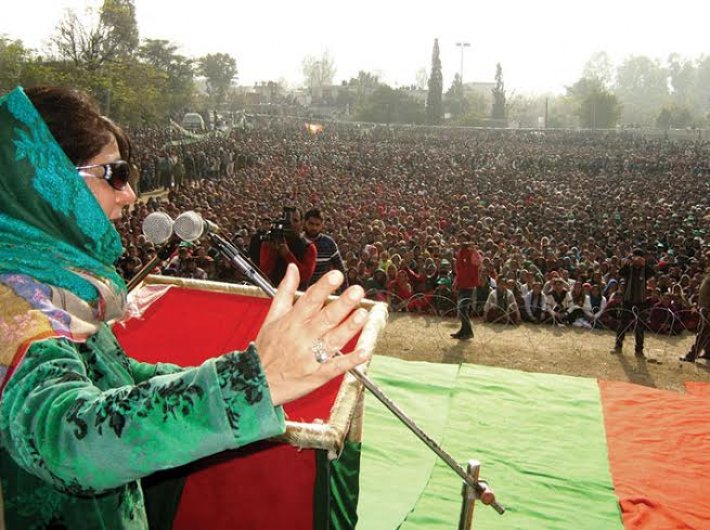Indian democracy is a great leveler for politicians. We saw this in Jammu and Kashmir recently. As the day of election results was advancing, the joyous faces inside the camps of the key victors – Bharatiya Janata Party and the Peoples Democratic Party (PDP) – were turning somber. The game of numbers that elections ended up at had dashed their hopes of a clean victory. The results threw up a hung legislative assembly, with both the parties emerging equally stronger in respective regions. Their leaders were now staring at a scenario of hard bargaining, haggling, posturing and a painful government formation and an even bigger pain of continuing, if it happens, at all. In both the camps, the drum beats were asked to go on a low pitch; leaders got into a huddle and emerged with a decision to wait for the call from the other for government- making partnership.
However, in Srinagar, one person had a gleeful expression on his face. He had pulled it off against all odds – negative media campaign, pessimistic poll analysts and doomsayers at home. All of them had almost ruined his party and lowered his own confidence. He said it all on the micro-blogging site Twitter: “Expectations were hyped & twisted to such an extent that now 17 feels like a victory & 28 a defeat. Go figure!!!!!”
Yes, this is the Twitter-happy Omar Abdullah, the 44-year-old former chief minister and scion of Kashmir’s first political family, the Abdullahs, whose party, National Conference, had been written off as the biggest loser of the just concluded elections, but has won 17 of the 87 assembly seats. Abdullah had campaigned without the presence of his charismatic father Farooq Abdullah. The latter was away in London for a kidney transplant during much of the time of electioneering.
On the other hand, the BJP was riding on the Narendra Modi wave coupled with Mission 44-plus while the Mufti Mohammad Sayeed’s PDP was hoping to make the most of the anti-incumbency wave against the Omar Abdullah government to score a decisive victory. Both have fallen short of their respective targets and are in a tie position. The BJP swept Jammu region and won 25 (plus two of former separatist and People’s Conference chairman Sajjad Lone’s); PDP with 28 in its kitty had left the hype of winning an absolute majority behind. Mehbooba Mufti of the PDP admitted, “We have not performed as per expectations.”
The BJP bigwigs in Delhi were exuding confidence at the saffron party’s surge in India’s only Muslim state, but leaders on the ground were upset at the results. “We were expecting at least two seats from Ladakh and also one more from Jammu region and emerge as the largest party,” a Jammu-based leader said.
Interestingly, while all others spent a restless night, Omar Abdullah was perhaps the only politician to sleep well. Before that he took jibes at the Muftis, “I gave them victory on a platter and if they could not make it, it is their fault,” Omar said in an interview. He was alluding to his regime’s mistakes – mishandling of floods, death of nearly 100 young Kashmiri ‘stone pelters’ in 2010, and so on. Like a little boy who discovers a surprise gift, Omar quipped, “I expect them to call me and then I will decide who should I go with.”
And his Twitter barbs at the Muftis continued. “Incidentally in 2002 Mufti became CM with 16 MLAs & NC with 28 sat in the opposition so excuse me if I don’t oblige by rolling over to play dead,’’ Omar wrote on Twitter, not pretending to be modest.
Omar’s reaction to a television channel was interesting. “Till a few hours ago, my knees were trembling with the fear of a possibility that I might lose both the seats.” Omar had lost the urban seat of Sonwar while managed to win from Beerwah in central Kashmir.
In Delhi, Congress veteran Ghulam Nabi Azad was also enjoying his sweet revenge on the pollsters and detractors in his own party. Against all pessimism he had led the election campaign in the state to end with 12 seats. Together with their former ally NC, they were a formidable third front in Kashmir.
A BJP-PDP may be a natural alliance keeping in view the unity between two distancing regions of the state. However, having emerged as equals, both the parties are facing the dilemma of accepting each other unconditionally. Also, the parties are expected to do tough bargaining to show off their regional identities before clinching the deal. However, Omar too may not mind supporting the BJP, as he has done before, to keep the PDP out of power this time.
The BJP, on its part, will have to evolve a long-term strategy to make at least its presence felt in Kashmir and Ladakh. Bereft of a party and leaders and only banking on a high octane media campaign has apparently failed, with not even displaced Kashmiri Hindus supporting it this election. BJP’s candidate Moti Koul from Habba Kadal constituency, which has a sizable number of Hindu voters, ended at the 7th place. Also, the elections have shown NC’s strength as the oldest regional party which the PDP will find difficult to compete with in future.
Every election has its surprises and novelties and this one should be remembered for making the winner look like a loser and the loser like a kingmaker.
The story appears in January 1-15, 2015, issue
